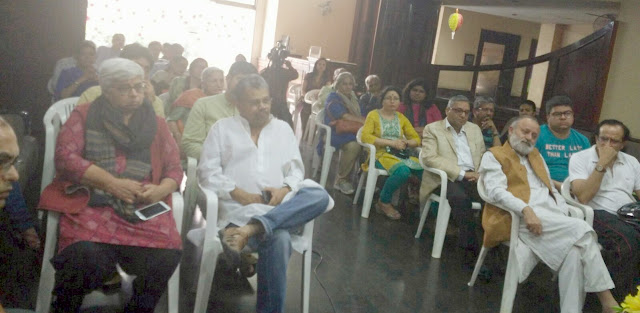Our effort is that residents of Dwarka Sub-city do not remain dependent on IIC and Habitat for intellectual and cultural enrichment. Though we cannot match the facilities but in terms of the intellectual and cultural discourse we are definitely matching them. It is not always possible for people from Dwarka to travel 25 kms to these centres.
In the series of Dwarka Baat Cheet being organised by Dwarka Collective every Sunday, on this Sunday 06 March, it was the well known Urdu and Hindi poet and writer Dr Sadique who gave a talk on Amir Khusro and Syncretic cultural tradition of India-the “Ganga-Jamni Tahazib”. The talk and the lively discussions that followed engrossed the audience.
Describing the famous 13th century Indian poet and scholar as a remarkable genius whose multifaceted talents and original contributions encompassed poetry , music , Sufi philosophy as well linguistics, Dr Sadique emphasized that Amir Khusro also embodied diverse traditions and can be described as a true representative of composite and syncretic cultural tradition of this land. Khusro’s father was Turkish, his mother Indian. He wrote both in Farsi, which was a court language and in Hindwi, a mix of tongues of common folk. His poetry adapted the “Doha” format which was never used before in Farsi and Hindwi and he also wrote Ghazals and geets. He originated the Quawwali and Ghazal styles and introduced words and phrases from local Indian languages such as Lahori (early name of Punjabi), Braj, Sindhi and other local dialects in his verses. Khusro also generated a kind of dictionary for Arabic-Persion-Hindwi vocabulary. He enriched Indian classical music by introducing best elements from Turkish and Arabic musical tradition that led to Khayal style of singing. He also created Tabla as an adaptation from Pakhawaj and he is credited with improvisations in Sarod and Sitar, the classical Indian string instruments. Khusro considered himself a disciple of Nizamuddin Aulia and was also helped by patronage provided by the Sultanate of Allauddin Khilji who ruled at Khusro’s time. Khusro was very fond of his homeland which he described in the phrase “Saren Jahanse achha” in Farsi which later was translated by the poet Iqbal. Dr Sadique concluded by stressing the importance of remembering Amir Khusro in the present milieu when attempts are being to deny syncretism in Indian cultural tradition and to enforce narrow sectarianism.
Describing the famous 13th century Indian poet and scholar as a remarkable genius whose multifaceted talents and original contributions encompassed poetry , music , Sufi philosophy as well linguistics, Dr Sadique emphasized that Amir Khusro also embodied diverse traditions and can be described as a true representative of composite and syncretic cultural tradition of this land. Khusro’s father was Turkish, his mother Indian. He wrote both in Farsi, which was a court language and in Hindwi, a mix of tongues of common folk. His poetry adapted the “Doha” format which was never used before in Farsi and Hindwi and he also wrote Ghazals and geets. He originated the Quawwali and Ghazal styles and introduced words and phrases from local Indian languages such as Lahori (early name of Punjabi), Braj, Sindhi and other local dialects in his verses. Khusro also generated a kind of dictionary for Arabic-Persion-Hindwi vocabulary. He enriched Indian classical music by introducing best elements from Turkish and Arabic musical tradition that led to Khayal style of singing. He also created Tabla as an adaptation from Pakhawaj and he is credited with improvisations in Sarod and Sitar, the classical Indian string instruments. Khusro considered himself a disciple of Nizamuddin Aulia and was also helped by patronage provided by the Sultanate of Allauddin Khilji who ruled at Khusro’s time. Khusro was very fond of his homeland which he described in the phrase “Saren Jahanse achha” in Farsi which later was translated by the poet Iqbal. Dr Sadique concluded by stressing the importance of remembering Amir Khusro in the present milieu when attempts are being to deny syncretism in Indian cultural tradition and to enforce narrow sectarianism.

